Q&A With Mark Davis: ‘Those Big Title Wins Get All the Hoopla, but Angler of the Year Is for the Angler’
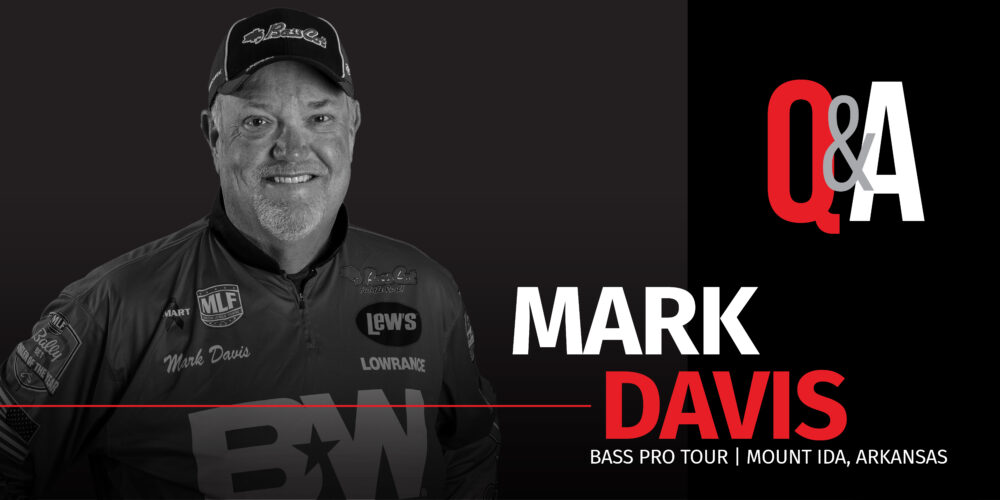
Working as a fishing guide at only 14 years old is how Mercury Pro Team angler Mark Davis embarked on a bass fishing career that landed him in the Bass Fishing Hall of Fame. Three Angler of the Year titles (1995, 1998, and 2001), hundreds of awards, millions of dollars in prize money and two video games based on his bass fishing prowess are just some of the accolades this Mount Ida, Arkansas, angler has racked up since his first professional tournament in 1986, and he’s still going strong.
Davis chatted with MLF about his fishing roots, goals, trials and tribulations – and a bit about his life off the water, too. Here’s what he had to say:
We’ve had a long break between major competitions. What have you been up to lately?
MD: Not a whole lot besides crappie fishing. I thought that since I’m home, I might as well guide a bit, but I had some good quality family time this summer and it has been great. I spent all of last summer in New York, but this summer has been nice being home with a lot of family time with my twin boys – Fisher is in school at East Texas Baptist University and Hunter is a lineman now. My oldest son, James, works up in Pennsylvania. It’s the worst time of year to fish here right now, it’s just so hot.
You were a crappie guide for many years before hitting it big in tournament bass fishing, but it looks like you’ve done a little guiding again recently. Tell us about that.
MD: I’ve had a lot of people ask throughout the years if I would guide and the answer was “no” because I quit guiding in 1995 when I won the Bassmaster Classic. But this year I decided to get back into it around May or June and it’s been fun. I started guiding for crappie, bass and walleye when I was a teenager. Any time you’re on the water, it’s good for your fishing. There was about a 60-day period where I guided almost every day right here at home on Lake Ouachita. I’m fortunate to live a mile away from the largest lake in Arkansas with lots of different fish to fish for.
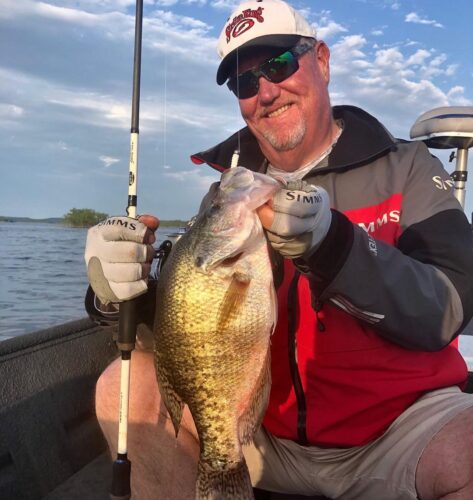
How did your experience as a guide help bring you into professional bass fishing?
MD: My first guide trip was when I was 14 years old. I was big for my age and my dad had a boat, so I rode a motorcycle back and forth to the lake. I took a trip to guide and this older guy, Ron, thought I was older than I actually was. While we were in the fish cleaning house filleting crappie, he asked me to guide a couple on Saturday morning since he always saw me catching fish. It was like $40 for a four-hour trip and that sounded pretty good to me at 14 years old.
I took the couple fishing and we had a great day, and caught a bunch of crappie and I filleted them. Then, the guy handed me $80 and I said, “No sir, it’s $40,” but he said “That’s your tip.” I made $80 and I got to enjoy the outdoors – I was hooked. I called Ron and said, “Any time you need me to guide, I’m available.”
I fished all the tournaments I could afford to fish and was working for my dad, who was a contractor. When I was 18, I told him I was going to make a living fishing and he said “I don’t know about that” – this would have been around 1981 or 1982. He wasn’t too keen on that idea and didn’t think it was a good idea. In those days, there weren’t many guys who truly made a living tournament fishing. My first B.A.S.S. event was in New York in 1985, and I’d never been further east than Nashville. I didn’t make a check, but I caught a lot of fish and went on to qualify for the Bassmaster Classic, and that’s when my career started.
Dad passed away in 1991 before I won the Classic, but by then I was well on my way to forging a career on tour, so he saw that I was going to be successful.
What’s your earliest fishing memory?
MD: I was very small, and I can remember catching some bluegill – I don’t know how old I was, most of us don’t have a lot of memories before 5 or 6 years old, but this was before that. When you’re a little bitty kid you want to turn it into a pet, so I had three bluegill in a bucket and was playing with them in the yard. I poured the water out of the bucket and panicked because I knew the fish wouldn’t live, so I had to get my dad to put more water in the bucket.
When did you first know that you wanted to go pro? How did your family react to this career/life goal?
MD: I lost my mother when I was 6 years old, so my dad raised me and we fished all the time in Hot Springs, Arkansas. When I was in grade school, Bobby Murray won the first Bassmaster Classic for $10,000 in 1971 and I remember thinking “Man, this guy is making a living catching bass,” so I was always eaten up with fishing and it was all I wanted to do.
Competitive fishing isn’t easy, so what motivates you to keep going?
MD: My wife says I’m a very competitive person. I don’t appear to be, but on the inside I’m pretty competitive. It’s easy to stay competitive because I love the sport and I love the fact that you have to remain a student of the sport. There’s always something coming that you have to embrace, and I enjoy all of that.
Out of all your fishing accomplishments, what are you most proud of?
MD: My three Angler of the Year titles are the most self-satisfying titles you can win. Classic wins and REDCREST wins are the most important to your career, but the most self-satisfying one is Angler of the Year because it takes a whole year of really good fishing to accomplish that. It’s so hard to do with all the obstacles and weather and the factors that go into one event after another. It’s hard not to have a blowout bad event, and I don’t think the fans can truly appreciate what that means at the level we’re competing at. Those big title wins get all the hoopla, but Angler of the Year is for the angler.
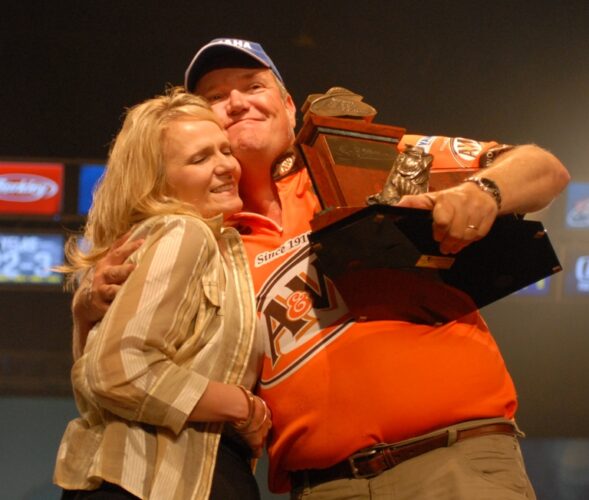
You’ve won millions of dollars and have been inducted onto the Bass Fishing Hall of Fame. What goals are you working toward now?
MD: After 37 years as a touring pro, retirement is in the back of your mind. I don’t know when that day is going to happen, but it’s not here yet. I want another Angler of the Year title, but I really just want to win a tournament again and you never know when that’s going to happen since everything has to fall just right – the right fish, right pattern, there’s so many hurdles to overcome to win and things just have to fall your way.
You’ve had two video games made about you (One for Super Nintendo in the mid-90s and one for PlayStation 2/GameCube in 2003). How did that happen? What was it like? Will there be another one?
MD: The Natsume Corporation contacted me in the mid-90s, and in those days the software was a multi-year task. You didn’t just sit down and make one overnight, it took years to put one of them together. I had to translate a lot of it into English and put my own spin on it since they wanted to personalize it to me. It was fun for the sayings, like they didn’t know what “dadgum it” was. The first game took about 18 months since they had the basic stuff done. But the second game, I worked with them on it for about three years before it was introduced. It was back and forth, and it was slow, but it was fun too. I haven’t been in contact with Natsume in years, but I’d love to do another one.
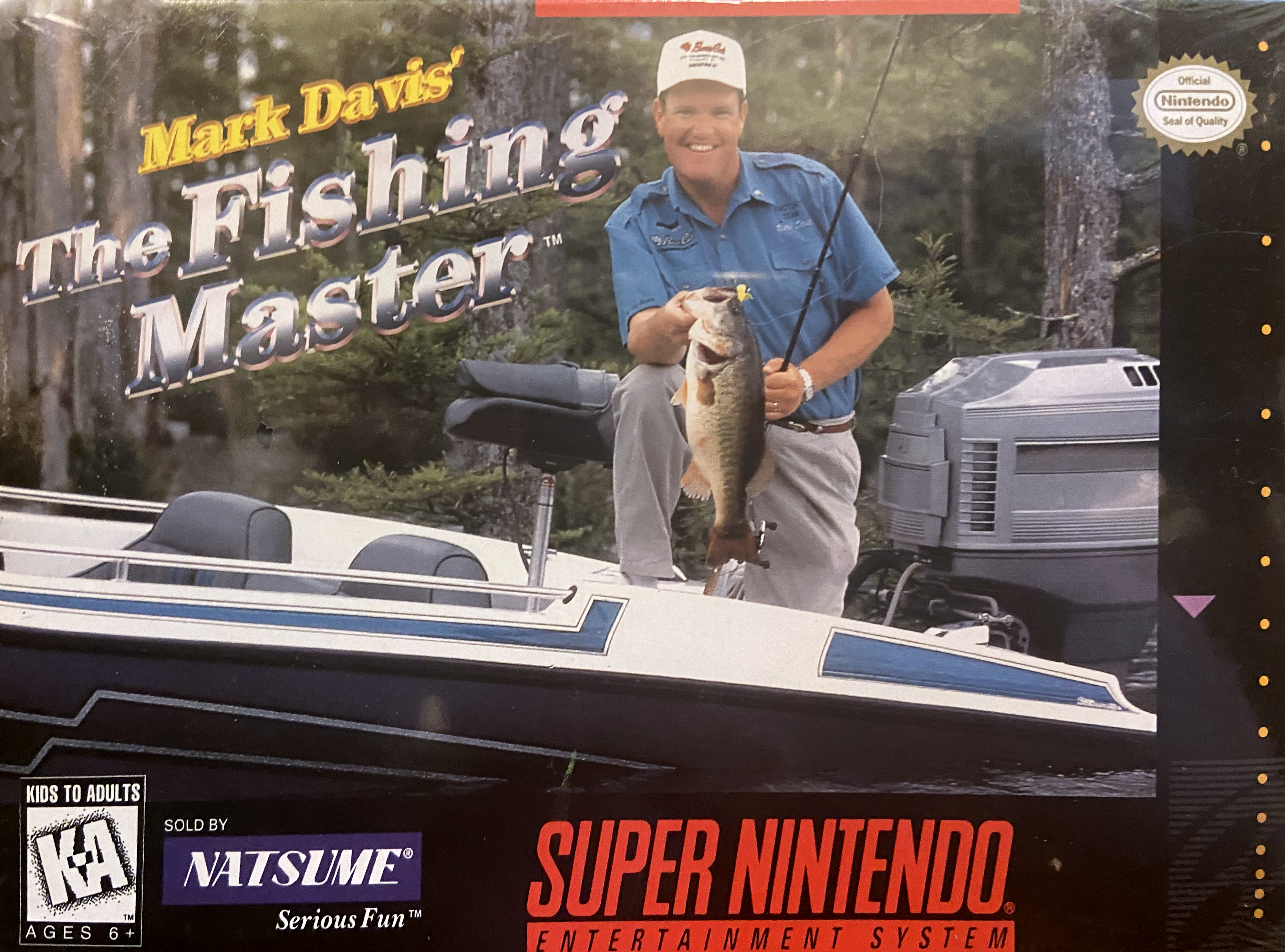
Fishing is a sport where you have to keep learning if you want to continue to succeed. What have you learned recently?
MD: Getting better versed with forward imaging with my Lowrance ActiveTarget, and then targeting multi-species of fish. That’s a big part of our game now. Gary (Klein) and I were talking about how you fish your entire career without something like that, and then it comes along and we embrace it, but you’re not all-in with it. It’s hard to teach an old dog new tricks, and that certainly applies with ActiveTarget forward imaging. But, I find myself on the water every day learning how to use and rely on it. That’s something I set out to get better at and I feel like I’m better at it after spending some time at home staring at that screen. It’s a game-changer, and as time goes on it’s going to get better and better. Who knows where it’s going? But, you learn to interpret what you’re seeing on there, and that’s a big part of it.
What’s the biggest challenge you’ve encountered in your fishing career and how did you overcome it?
MD: There’s so many challenges but you have to trust your instincts. I do better when I totally trust my instincts and intuition. Don’t get caught up in doing what the rest of the field is doing. If you think something will work, then follow your instincts and intuitions. It’s easy to say, but hard to do. You need to totally trust yourself and your abilities, and keep your confidence level where it needs to be and not pay attention what’s going on around you. There’s more than one way to catch fish. Trusting your instincts sounds profound, but it can be difficult to do in competition because you’ll look around and see someone beating you by doing something, but your gut says to get out and go do something else – you need to believe that and make it work. Things will go well when you do that. But when you don’t, that’s when you get in a rut.
How do you keep your cool during those high-pressure moments?
MD: You’re sweating bullets and it’s easier to win when you’re slightly behind because you have less pressure on you. When you’re leading, you have the crosshairs on you. I know my toughest Angler of the Year titles were when I led midway through the season and held the lead all the way through.
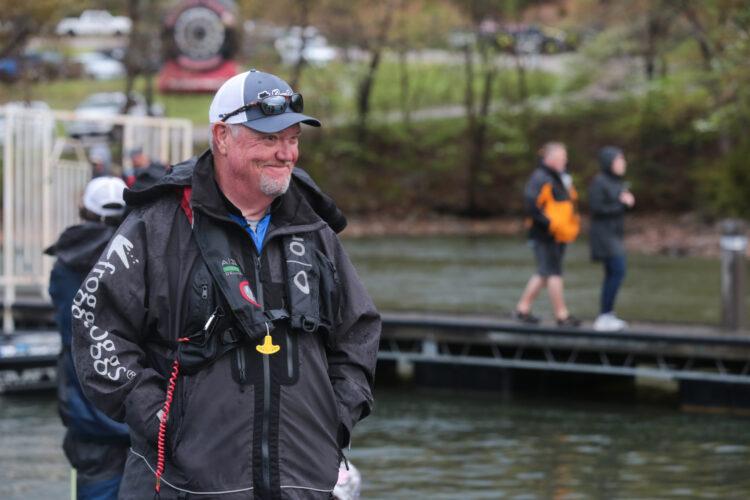
You’ve had a handful of injuries and ailments to work through in recent years, how are the shoulders, elbows, wrists and knees feeling? Are you refreshed heading into the final two tournaments of the season?
MD: I’m all healed up and good to go, but I’ve had multiple surgeries that are all fishing related. I had a triple fusion in my neck, three shoulder surgeries, plus my elbow and hip – and all of them are related to fishing. My right hip was replaced, but the left one is normal since I put my weight on my right leg and run the motor with my left. I’m a big guy, and all those years of it wore the right hip down. As for the elbow deal, that’s from before mechanical steering while making those long runs and using your right arm for the throttle and holding the steering wheel with your left arm. Then for my shoulders, it’s from repetitive casting. Fishing has taken a toll on my body. I fish almost every day when I’m at home, too. It’s a lot of wear and tear when you do it for 30 to 40 years – a lot of repetitive motion.
If you weren’t a pro angler, what would you be?
MD: My second love and passion I let fall by the wayside is music. Perhaps if I nurtured that, I might have tried to make a living at music, but I didn’t give it a chance to happen. If not fishing and not music, then I don’t know. I would probably be a blue-collar guy and followed in dad’s footsteps and built houses for a living.
If you had to go on American Idol or The Voice, which song would you sing and why?
MD: If I knew I was going on American Idol, I would have to find some new material. A lot of the stuff I do, they might not even recognize it. There is two kinds of music – Country and Western. It would be in that category, but I’d need to learn some new material. A lot of the stuff I listen to my wife calls “old” music, like Johnny Cash and Waylon Jennings, but that’s what I listen to. As for my favorite song, that’s like asking what is my favorite flavor of ice cream. I like a lot of them, but my favorite is a hymn called “There’s Victory in Jesus.” It’s not Country and Western, but it’s an old hymn. If I picked up my guitar, which I haven’t done in a couple of years, the first song would be “Luckenbach, Texas” by Waylon Jennings. It’s the first song on my playlist.
What do you miss most about home when you’re on the road?
MD: Just the comfort, there’s no place like home. Honestly, when you’re home for a long time, that’s the hardest time to leave. But, once you’re on the road, you get back into the groove and accustomed to life on the road. I’m more than content out there on the road. During this stretch here, we’ve been home for quite a while. But, once you’re back in the groove, you forget about it and home is the road. There are some guys who try it and don’t get comfortable with it, and their careers suffer because of it.
Who do you usually travel with when on Tour? What are they like when off the water?
MD: I travel with Gary Klein a lot and we room together quite a bit but not always since I’m with my wife (Tilly) in a RV recently. He and I are a lot alike, we’re always thinking about fishing. He’s easy-going and it’s neat to run with a guy like that and bounce ideas off each other and learn from each other.
How are you feeling about Lake Cayuga in early August?
MD: I feel good. Cayuga is a finger lake and it’s primarily a largemouth event with a lot of grass and a lot of fish. Most of the water we go to up north, the fishing is good and Cayuga won’t be the exception. I haven’t been there in a few years, but I’ve been there several times in my career and I’m looking forward to it.